| |
|
|
|
|
|
|
|
|
|
|
| |
| |
 |
|
| |
田润德
编译文/图 2020-02-2
19:36 |
|
| |
|
|
|
|
| |
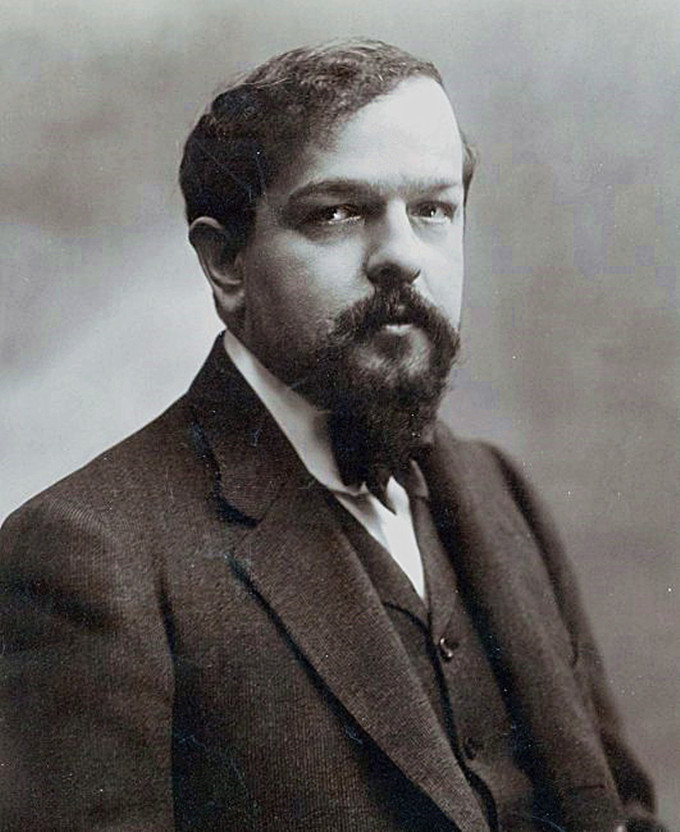 |
|
|
|
| |
克劳德·德彪西(Achille-Claude Debussy 1862-1918) |
|
|
|
| |
|
|
|
|
| |
【德彪西】大海 La Mer (卡拉扬指挥
|
|
|
|
| |
交响音画《大海》,作于1905年三月。本曲为德彪西最大的一部交响音乐作品,由三个不同内容的乐章组成,但每个乐章之间又有内在的联系,集中起来构成一部完整的作品。它表现了“大海”的景色及其富有动态的性格,并通过整个乐队的不同音区,极为强烈地表现出“大海”中各种画面的色彩。乐曲在时间和空间上给人以完整的“海”的印象和对海的幻想。新颖的和声、短小的旋律、丰富的音色、自由的发展,这些印象派的手法,都生动地刻画出了一幅幅大海的生动画面。 |
|
|
|
| |
|
|
|
|
| |
音乐历史上的今天
1911年2月6日,德彪西这样评价维也纳:“颓废之城,到处充斥着布拉姆斯和普契尼的音乐,到处都是躲在女人怀里的军官,到处都是依偎在军官胸前的女人。”
维也纳这样评论德彪西:“宽肩膀的男人,有乌黑如炭的头发和尖尖的胡子;举止有点儿懒散笨拙,眼神中带着一种种阴郁和厌倦。”
克劳德·德彪西(Achille-Claude
Debussy,1862年8月22日-1918年3月25日)20世纪世界最重要、最伟大、最富创造性的作曲家之一,
他还是钢琴家、音乐评论家,并是印象主义音乐的创始人。
十九世纪末,二十世纪初欧洲音乐颇受影响的作曲家、革新家,对欧美各国的音乐产生了深远的影响,他在马斯内开创的法国音乐传统影响下,结合了东方音乐西班牙舞曲和爵士乐等音乐特点,创造出了别具一格的和声,其代表作品有管弦乐《大海》,牧神午后前奏曲,钢琴曲,练习曲,他的创作最高峰应该是歌剧《佩利亚斯与梅丽桑德》。
1862年,德彪西出生在法国圣热曼昂莱的一个小资产阶级家中,父母经营一家小陶瓷店,后因经营不善破产倒闭。父亲又因参加巴黎公社起义而被监禁,这使德彪西的幼年生活动荡不安,未受多少正规教育。8岁起跟从肖邦的学生、魏尔伦的岳母莫泰·德·弗勒维耶夫人学习钢琴。1
873年入巴黎音乐学院,师从拉维尼亚克、马蒙泰尔和迪朗。在此期间有弹钢琴错音、和声与乐理问题上无法无天的名声。
1880年与1881年暑假德彪西去俄罗斯打工,在柴科夫斯基的赞助人梅克夫人家当家庭钢琴教师,并随她到意大利、奥地利旅行,接触到俄罗斯音乐。他对柴科夫斯基没有兴趣,但深受穆索尔斯基的影响。17岁时因未获钢琴奖而使双亲对他成为钢琴家不抱希望。次年德彪西却获得总谱读法一等奖,使他得以进入作曲系。
1899年德彪西与裁缝罗萨莉(莉莉).泰克西埃结婚,5年后离婚。不久又和一位银行家的妻子、歌唱家爱玛·巴尔达克夫人相好,两人于1905年结婚,同年交响素描《大海》首次演出并获得成功。1918年3月2
5日,德彪西逝世于巴黎。当时,德国的炮弹已经轰击法国首都巴黎多日,战局非常严重,因此当他下葬时,仪式十分简单,少数送葬人中有的还戎装在身。
德彪西的印象主义逐渐成为他创作的主导原则。在钢琴音乐中,他发现了过去作曲家很少注意或根本不注意的音响。他的音乐具有勾起人们联想的力量,但却并非模糊不清,而显示出最大可能的精确、严谨的技法。德彪西还是一位著名的音乐评论家,他的评论性著作虽然有时失之偏颇,但却总是直率而风趣。
1884年因康塔塔《浪子》获罗马大奖。1885年去罗马进修,1887年返回巴黎。1888年和1889年去拜罗伊特参加音乐节。
第一次世界大战爆发后,德彪西写了3部反映战争的作品——《英雄摇篮曲》和《无家可归的儿童的圣诞歌》等,表明了他的爱国热忱;他在这一时期创作的作品,都签署了“克洛德。德彪西,法国音乐家”的字样。德彪西的晚年是在疾病中度过的,他感到沉重的压抑,但依然挣扎着坚持写作。这时,他重新回到90年代接触过、但中断了20多年的室内乐创作,可是计划中的6首奏鸣曲只写出3首。
德彪西的音乐风格特点是借助标题和丰富的色调变化来引起联想,少直率的表达,多音乐的暗示。他的音乐避免文学性的叙事,似乎缺少一种激情。在音乐方面,德彪西的曲调多是自由、不对称的发展,以零碎片断的短句出现。德彪西音乐作品内容的主要领域是通过对自然景物的描绘以引起人们的遐想,及回忆早已消逝的梦境和再现某些生活场面。
今日视频:1、卡拉扬指挥柏林爱乐演奏德彪西的交响诗《大海》。
2、哈尔滨出生的钢琴巨匠阿纳托利·维德尼科夫
(Anatoly
Vedernikov)演奏德彪西作品。虽然他最擅长德奥系音乐,特别是贝多芬的作品,但这本德彪西也是极好的一部,难得的钢琴奇才。 |
|
|
|
| |
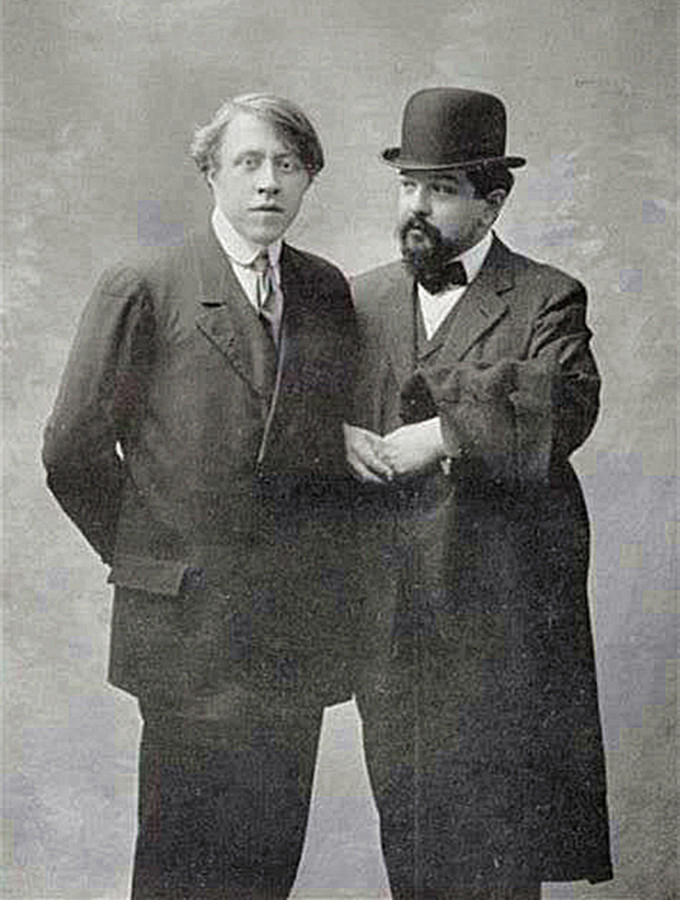 |
|
|
|
| |
克劳德·德彪西和好友安德烈·卡普列 |
|
|
|
| |
Today in music history
On February 6, 1911, Debussy said of Vienna: "the decadent city is full
of Brahms and puccini music, full of officers hiding in the arms of
women, full of women snuggling in the chest of officers."
Vienna said of Debussy: "a man with broad shoulders has hair as black as
charcoal and a pointed beard;There was something languid and clumsy in
his manner, and a melancholy and weariness in his eyes."
Achille-claude Debussy (August 22, 1862 -- March 25, 1918) was one of
the most important, greatest and creative composers of the 20th century.
He was also a pianist, a music critic, and the founder of impressionist
music.
End of the 19th century, the early twentieth century European music
quite affected by the composer, innovators, had a profound impact on
European and American countries music, he created in massenet the French
music under the influence of traditional, combines the Oriental music
Spanish dance music and jazz music characteristics, create a unique
harmony, its representative works include orchestral music "the sea",
fauns afternoon preludes, piano, etude, his creative peak should be
opera peja arias and merry sander.
In 1862, Debussy was born in a small bourgeois family in saint-germain,
France. His parents ran a small ceramic shop, which went bankrupt due to
poor management.His father was also imprisoned for taking part in the
Paris commune uprising, which unsettled Debussy's early life with little
formal education.At the age of eight, he studied piano with mme morte DE
flavier, one of Chopin's pupils and verlaine's mother-in-law.He joined
the Paris conservatory of music in 1873, where he studied under lavinac,
mamontel and d 'uron.During this period there was a reputation for
playing the piano in wrong notes, harmonies and music theory.
In 1880 and 1881 summer vacation Debussy went to Russia to work, in
Tchaikovsky's patron madame meck family as a home piano teacher, and
with her to Italy, Austria travel, exposure to Russian music.He had no
interest in Tchaikovsky but was heavily influenced by musorgsky.His
failure to win a piano prize at the age of 17 discouraged his parents
from becoming a pianist.The next year Debussy won the first prize in
score reading, which enabled him to enter the composition department.
In 1899, Debussy and the tailor Rosalie (lilly).Techier married and
divorced five years later.They married in 1905, the same year that the
symphony sketch "the sea" was first performed and was a success.Debussy
died in Paris on March 25, 1918.When he was buried, the ceremony was
simple, and some of the few mourners were still in full military
uniform.
Debussy's impressionism gradually became the leading principle of his
creation.In piano music, he found sounds that composers had paid little
or no attention to in the past.His music has evocative power, but it is
not vague, and shows the greatest possible precision and precision of
technique.Debussy is also a famous music critic, his critical works
although sometimes biased, but always straightforward and funny.
In 1884, he won the Rome prize for cantata's prodigal son.He went to
Rome in 1885 to study and returned to Paris in 1887.In 1888 and 1889 he
went to bayreuth for the music festival.
After the outbreak of the first world war, Debussy wrote three works
reflecting the war -- "hero lullaby" and "homeless children's Christmas
song", showing his patriotic enthusiasm;All the works he made during
this period were signed "Claude.Debussy, French musician.Debussy spent
his later years in illness, he felt depressed, but still struggled to
keep writing.At this point, he returned to the chamber music he had been
working on for more than 20 years in the 1990s, but only wrote three of
the six sonatas he had planned.
Debussy's musical style is characterized by the use of titles and rich
tonal changes to arouse associations, less straightforward expression,
more musical hints.His music avoids literary narrative and seems to lack
a passion.In music, Debussy's tunes are mostly free, asymmetrical
development, in fragments of short sentences appear.The main field of
Debussy's music works is to arouse people's reverie by describing the
natural scenery, and to recall the dream which has already vanished and
to reproduce some life scenes.
Today's video: 1. Karajan conducts the Berlin philharmonic to play
Debussy's symphonic poem the sea.
2. Harbin born piano giant vidnikov plays the works of Debussy.Although
he was best at German and Austrian music, especially Beethoven, this
Debussy was also an excellent work, a rare piano prodigy. |
|
|
|
| |
 |
|
| |
克劳德·德彪西(Achille-Claude Debussy)在演奏钢琴 |
|
|
|
| |
《大海》作于1903—1905年,在此期间,德彪西先在其妻丽莉家开始动笔,1904年他抛弃了丽莉,与艾玛私奔泽西岛,在艾玛身边完成了配曲。德彪西认为,此曲创作源于记忆:“大海为什么在冲刷着布尔果尼的斜坡?我拥有数不清的记忆。这些在我的感觉里比实景更有用。因为现实的魅力对于思考,一般来说还是一项过于沉重的负担。”“谁会知道音乐创造的秘密?那海的声音,海空划出的曲线,绿荫深处的拂面清风,小鸟啼啭的歌声,这些无不在我心中形成富丽多变的印象。突然,这些意象会毫无理由地,以记忆的一点向外围扩展,于是音乐出现了,其本身就自然含有和声。
该曲是德彪西最大的一部交响音乐作品,由三个不同内容的乐章组成,但每个乐章之间又有内在的联系,集中起来构成一部完整的作品。它表现了“大海”的景色及其富有动态的性格,并通过整个乐队的不同音区,极为强烈地表现出“大海”中各种画面的色彩。乐曲在时间和空间上给人以完整的“海”的印象和对海的幻想。新颖的和声、短小的旋律、丰富的音色、自由的发展,这些印象派的手法,都生动地刻画出了一幅幅大海的生动画面。
|
|
|
|
| |
"The sea"
was written in 1903-1905. During this period, Debussy first started
writing at the home of his wife lili. In 1904, he abandoned lili and
eloped with Emma in jersey.According to Debussy, the song was composed
from memory: "why is the sea washing the slopes of bulgogne?I have
countless memories.These are more useful in my mind than in real
life.Because the glamour of reality is generally too heavy a burden to
bear.""Who knows the secret of music creation?The sound of the sea, the
curve of the sea, the clear breeze in the shade, the song of the birds,
all these formed a voluptuous impression in my mind.All of a sudden,
without any reason, these images would spread out into the periphery as
a memory point, and the music would emerge, naturally having harmony in
itself.
This piece is Debussy's largest symphonic music work, composed of three
different movements, but each movement has an internal connection,
together constitute a complete work.It shows the scenery of "the sea"
and its dynamic character, and shows the colors of various pictures in
"the sea" very strongly through the different sound areas of the whole
band.Music in time and space to give a complete "sea" impression and
fantasy of the sea.Novel harmonies, short melodies, rich timbre and free
development, all of these impressionist techniques vividly depict vivid
pictures of the sea.
|
|
|
|
| |
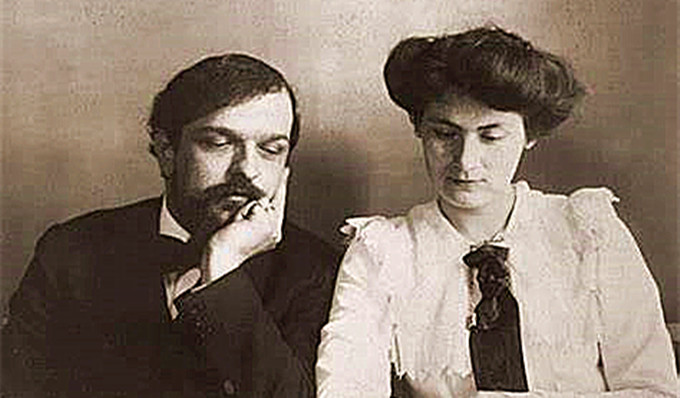 |
|
|
|
| |
克劳德·德彪西(Achille-Claude Debussy)和夫人 |
|
|
|
| |
 |
|
|
|
| |
克劳德·德彪西(Achille-Claude Debussy)和女儿 |
|
|
|
| |
|
|
|
|
| |
 |
|
|
|
| |
阿纳托利·维德尼科夫(Anatoly Vedernikov) |
|
|
|
| |
出生:1920年-中国 哈尔滨
去世时间:1993年-俄罗斯莫斯科
俄罗斯钢琴家、音乐教师阿纳托利(托利亚)·伊万诺维奇·维捷尔尼科夫,1920年出生于哈尔滨的一个贸易工人家庭。他的表演生涯始于1930年,当时他是一名钢琴天才。1933年毕业于哈尔滨高等音乐学院(狄龙六班)。1936年之前,他在中国和日本举办音乐会(在那里他师从钢琴家西罗塔)。1936年,他进入莫斯科音乐学院(师从海因里希·涅高兹),1947年毕业。1937年,他的父母都受到镇压,他的父亲被枪决,他的母亲被判处8年徒刑。
1942年,阿纳托利·维捷尔尼科夫在莫斯科举行了他的第一次个人音乐会。1945年参加全联盟演奏音乐家比赛,但没有进入第三轮。1937年到达莫斯科时,他成为了斯维亚托斯拉夫·里希特(Sviatoslav
Richter)(也是海因里希·涅高兹Heinrich
Neuhaus的学生)的好朋友。1940-1959年,他们经常一起演出:巴赫协奏曲、肖邦回奏曲、李斯特钢琴协奏曲、德彪西黑色与白色、拉赫玛尼诺夫第二组曲、巴托克·贝拉奏鸣曲。他与普罗科菲耶夫的创作关系将他联系在一起,普罗科菲耶夫指示他为他的一些作品做转录和乐器演奏;维捷尔尼科夫是他的《钢琴与管弦乐队第四协奏曲》在俄罗斯的首演。他也是第一个(继作曲家之后)演奏第一和第二十四首钢琴前奏曲和赋格,作品87由德米特里·肖斯塔科维奇,谁重视他的作品的解释。维捷尔尼科夫成为莫斯科音乐会现场的独奏家,但他的音乐活动主要发生在外围。
1958年起,阿纳托利·维捷尔尼科夫任教于格涅辛音乐教育学院(1963年起为副教授),1980年起任教于莫斯科音乐学院(1985年起为教授)。他的学生中有A.V.谢卢迪亚科夫和N.S.基斯连科。他的职业生涯没有在苏联以外发展,但自1969年以来,他开始在国外(在社会主义国家)演出;1980年,他在意大利和苏格兰首演,然后在芬兰和德国巡回演出。1983年被授予“俄罗斯苏维埃社会主义共和国荣誉艺术家”称号。
维捷尔尼科夫的表演风格表现出不同的理性主义思想。他更喜欢哲学计划的产物:巴赫、贝多芬、弗兰克。他也被认为是肖邦、德彪西和20世纪音乐的伟大演奏家。他是俄罗斯许多20世纪作曲家作品的第一位表演者:b<s:1>
Bartók, Paul hindemmith (Ludus tonalis循环等),以及G.I.
Ustvolskaya的第二奏鸣曲和V.E.索斯林的奏鸣曲的世界首演。
Anatoly Vedernikov于1993年在莫斯科去世。他去世后,日本厂牌Denon发行了26张CD的《钢琴家》(截至2000年)。 |
|
|
|
| |
 |
|
| |
阿纳托利·维德尼科夫(Anatoly Vedernikov) |
|
|
|
| |
Anatoly Vedernikov
(Piano, Arranger)
Born: 1920 - Harbin, china
Died: 1993 - Moscow, Russia
The Russian pianist and music teacher, Anatoly (Tolia) Ivanovich
Vedernikov, was born in Harbin in 1920 in the family trade worker. His
performing career began in 1930 as a pianist-prodigy. In 1933 he
graduated from the Higher School of Music in Harbin (Class VI Dilon).
Before 1936 he gave concerts in China and Japan (where he took lessons
from pianist L. Sirota). In 1936 he entered the Moscow Conservatory (in
the class of Heinrich Neuhaus), from which he graduated in 1947. In
1937, both his parents were repressed: his father was shot, and his
mother was sentenced to 8 years imprisonment.
In 1942, Anatoly Vedernikov gave his first solo concert in Moscow. In
1945 took part in the All-Union Competition of performing musicians, but
was not admitted to the 3rd round. He became a great friend of
Sviatoslav Richter (also a student of Heinrich Neuhaus) when he arrived
in Moscow in 1937. In 1940-1959, they often performed together: J.S.
Bach's Concerto, Rondo of Frédéric Chopin, Concerto pathétique of Franz
Liszt, En blanc et noir of Debussy, the 2nd Suite of Sergei Rachmaninov
and Béla Bartók's Sonata.. Creative relationship tied the pianist with
Prokofiev, who instructed him to do transcriptions and instrumentation
of a number of his works; Vedernikov was the first performer in Russia
of his Fourth Concerto for Piano and Orchestra. He was also the first
(after the composer) to perform the 1st and 24th Preludes & Fugues for
piano, Op. 87 by Dmitri Shostakovich, who valued the interpretation of
his works. Vedernikov became a soloist on the Moscow concert scene, but
his musical activities took primarily place on the periphery.
From 1958 Anatoly Vedernikov taught at Musical-Pedagogical Gnesin
Institute (since 1963 Associate Professor), since 1980 at the Moscow
Conservatory (since 1985 Professor). Among his pupils were A.V.
Sheludyakov, N.S. Kislenko. His career did not develop outstide the
Soviet Unions, but since 1969 he began performing abroad (in the
socialist countries); in 1980 he made his debut in Italy and Scotland,
then toured in Finland and Germany. In 1983 he was awarded the title of
"Honored Artist of the RSFSR '.
The Performing style of Anatoly Vedernikov shows different intellectual
rationalism. He preferred product of philosophical plan: J.S. Bach, L.v.
Beethoven, César Franck. He was also considered a great performer of
Frédéric Chopin, Debussy and music of the 20th Century. He was the first
performer in Russia of many works of 20th Century composers: Béla
Bartók, Paul Hindemith (Ludus tonalis cycle, etc.), as well as performed
world premieres of the 2nd sonata of G.I. Ustvolskaya and sonatas by
V.E. Souslin.
Anatoly Vedernikov died in Moscow in 1993. After his death, the Japanese
label Denon issued on 26 CD's pianist (as of 2000).
|
|
|
|
| |
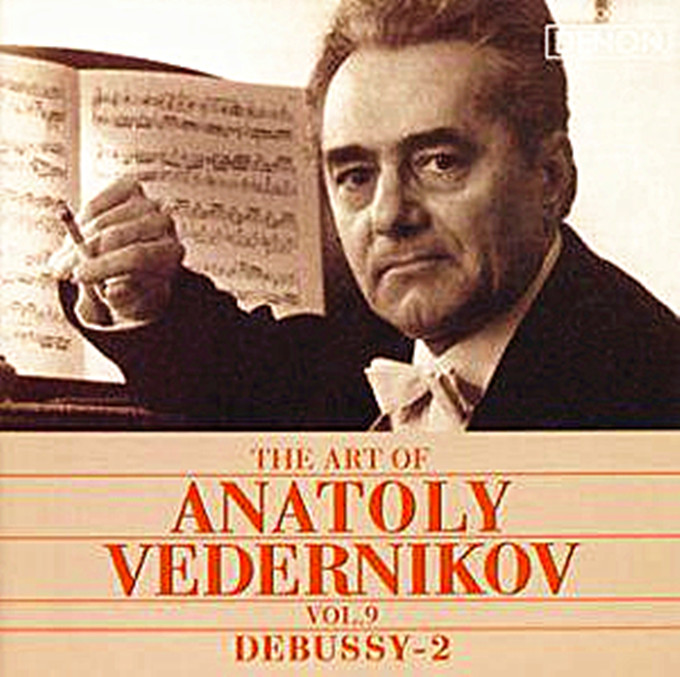 |
|
| |
维德尼科夫演奏的唱片封面 |
|
|
|
| |
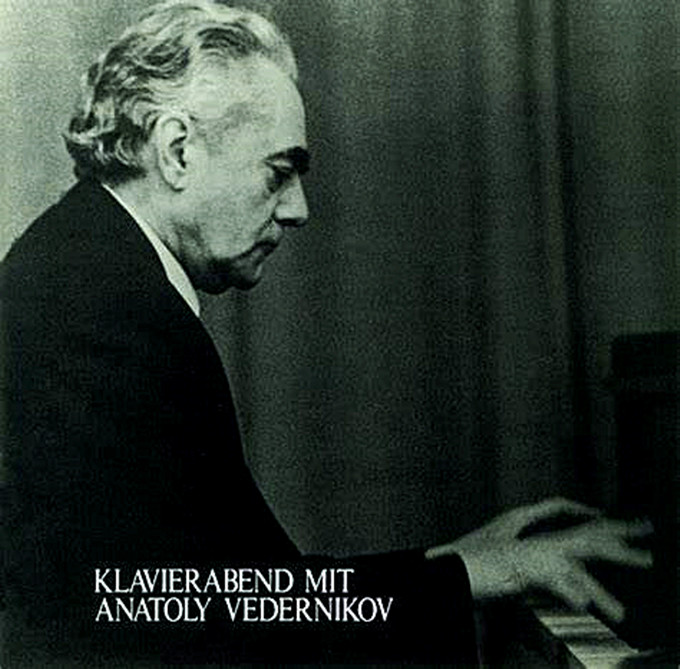 |
|
|
|
| |
阿纳托利·维德尼科夫(Anatoly Vedernikov)在演奏 |
|
|
|
| |
|
|
|
|
| |
德彪西《贝加摩组曲》钢琴巨匠维德尼科夫演奏 |
|
|
|
| |
阿纳托利·伊万诺维奇·维德尼科夫(Anatoly Ivanovich
Vedernikov)1920年出生于中国哈尔滨,1993年于莫斯科逝世,是俄罗斯著名的钢琴家。师承苏联著名钢琴大师海因里希·涅高兹,与同门师兄里赫特是好友。擅长德奥系的曲目,尤其是贝多芬的曲目。维德尼科夫是个音色变化的大师,他光靠细微音色变化便可以形成特殊的织体,隐含着张力维系他那慢得出奇的慢板乐章弹奏。当回到快板时,他又能够将丰沛的能量注入这些快速、清晰的音群之中。他的音色很特别,有如经琢磨般的琴音像是不经过键盘迳自由钢琴内部涌出,自然地鸣响,带着温暖、不可思议的透明感渗入听众的内心深处。你永远摸不透这充满魅力的琴音向前推动的力量来自何处?他的演奏不像里赫特、吉利尔斯会让人立刻意识到在音乐演奏的背后有一颗与众不同,匠心独具的头脑;他的音乐,令人联想到巴克豪斯(Wilhelm
Backhaus)这位钢琴家,音乐是自然地流动。不管是什么类型的音乐,都没有多余的表情、戏剧性的演奏效果
。 |
|
|
|
| |
钢琴家维德尼科夫
被誉为神童,10岁开始公开演出。1933年,他从哈尔滨的高等音乐学院毕业并获得金质奖章。1935年(15岁)维德尼科夫前往日本,与新交响乐团(也就是现在的NHK交响乐团)一起演出,大受好评。日本演出之后,维德尼科夫和家人回到苏联,后来因为斯大林的肃清运动,维德尼科夫的父母遭到逮补,不久后父亲被枪杀,母亲则被强制送到收容所。当时在莫斯科音乐学院深造的维德尼科夫,也被列在通缉名单之中,而涅高兹则是他的钢琴老师。涅高兹曾断言,维德尼科夫足以与里赫特(斯维亚托斯拉夫·特奥菲洛维奇·里赫特)、吉利尔斯(埃米尔·吉利尔斯)齐名,而这三个人是他最感骄傲的学生,维氏的钢琴技艺足以称霸一方。
然而由于维德尼科夫被苏维埃共产政权盯上,所以始终无法如吉利尔斯(20世纪五十年代初期获得出国演出批准)、里赫特(20世纪五十年代末期获得出国演出批准)一样出国演奏,活跃范围一直在俄国境内,直到旧苏联瓦解之后,他终于可以前往国外演奏(20世纪八十年代初期),他先后前往意大利、芬兰、德国等地举行演奏会。原本维德尼科夫预定在1993年回到久违半世纪的日本演奏,但却在公演之前的1993月7月去世。在维德尼科夫死后,他的录音首度在日本发行,引起相当大的反响。 |
|
|
|
| |
Anatoly
Ivanovich Vedernikov was born in Harbin, China in
1920. He died in Moscow in 1993.Under the guidance
of the famous Soviet piano master heinrich niegorz,
and the same door brother Richter is a good
friend.He is good at German and Austrian works,
especially those of Beethoven.
Vydnikov was a master of inflection, creating a
special texture with only slight inflection, with
the implied tension that held his surprisingly slow
adagio together.When he returned to allegro, he was
able to infuse these fast, clear vocal groups with
abundant energy.
He had a very special tone, a polished sound that
gushed out of the piano without going through the
keyboard, and sounded naturally, with a warmth and
an incredible transparency that seeped into the
heart of the audience.You'll never know where the
power of the charmful music comes from.His playing
is not like Richter or gillies, which makes people
immediately realize that there is a different and
unique mind behind the music playing.His music,
reminiscent of the pianist Wilhelm Backhaus, flows
naturally.No matter what type of music, there is no
redundant expression, dramatic performance effect. |
|
|
|
| |
Acclaimed as a child prodigy, pianist vidnikov began
performing in public at the age of 10.In 1933, he
graduated from the higher conservatory of music in
Harbin and was awarded a gold medal.In 1935 (at age
15), vidnikov went to Japan to perform with the new
symphony orchestra, now known as NHK, to great
acclaim.After performing in Japan, vidnikov returned
with his family to the Soviet union, where his
parents were arrested for Stalin's purgatory, his
father shot and his mother forcibly taken to an
asylum.Vedernikov, then studying at the Moscow
conservatory of music, was also on the wanted list,
while niegorz was his piano teacher.Niegorz once
asserted that vidnikov was worthy of the name of
Richter (sviatoslav teofilovich Richter) and giles
(Emile giles), his three proudest students, whose
piano skills were enough to dominate.Yet because
wade who targeted by Soviet communist regime, so
always can't such as geely, (the early 50 s of the
20th century performance abroad approved), in the
hurt (50 s of the 20th century approval performance
abroad) to play abroad, active range has been within
the territory of Russia, until after the old Soviet
union, he finally can go to play abroad (in the
early eighty s of the 20th century), he went to
Italy, Finland, Germany and other places held a
concert.Vidnikov was scheduled to return to Japan in
1993 after a long absence of half a century to play,
but died in July 1993, before the public
performance.After vidnikov's death, his recordings
were first released in Japan, to considerable
acclaim. |
|
|
|
| |
|
|
|
|
| |
未得原作者编者授权严禁转载www.mt77.com任何内容 |
|
|
|
|
|
|
|
|
|
|
|
|
|
|


